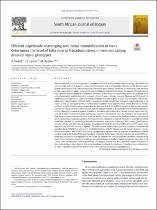Efficient superoxide scavenging and metal immobilization in roots determines the level of tolerance to vanadium stress in two contrasting Brassica napus genotypes
Abstract
Brassica napus also known as Rapeseed is a member of the Brassicaceae family which is mainly cultivated for its
oil-rich seeds. Indeed, B. napus is ranked the third-largest source of vegetable oil in the world. Brassica napus
growth, development and yield are negatively affected by heavy metals. Vanadium is a heavy metal and presence
in high concentrations impact plant growth and development negatively. However, the impact of Vanadium on B.
napus growth and development is unknown. Therefore, in this study we assessed the effects of Vanadium stress
on leaf physiology and biochemistry response of two B. napus cultivars (namely Agamax and AV Garnet). A
randomised pot-experiment under controlled conditions was used to grow B. napus cultivars under control (dis-
tilled water) and Vanadium (350 μM NaVO3) treatments. Results showed that Vanadium caused yellowing of AV
Garnet leaves but not Agamax leaves. Furthermore, Vanadium stress caused a more severe decrease in leaf dry
and fresh weight of AV Garnet as compared to the decrease in leaf dry and fresh weight of Agamax.

